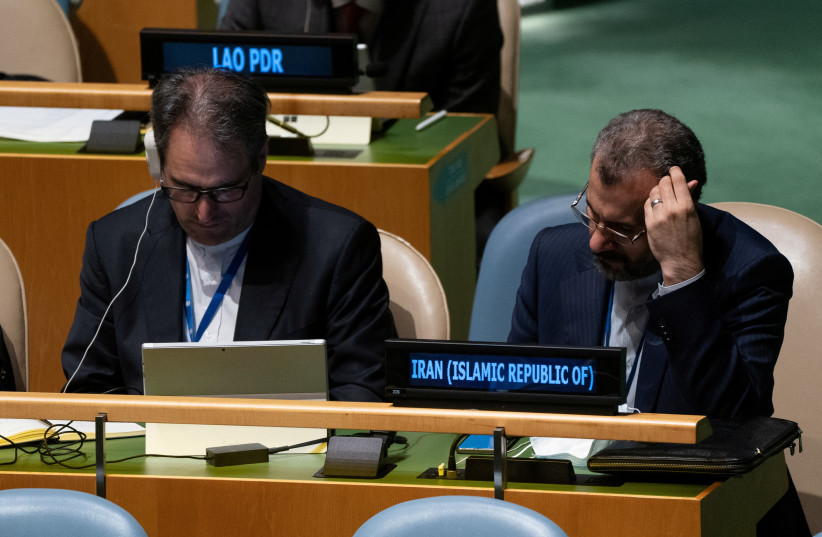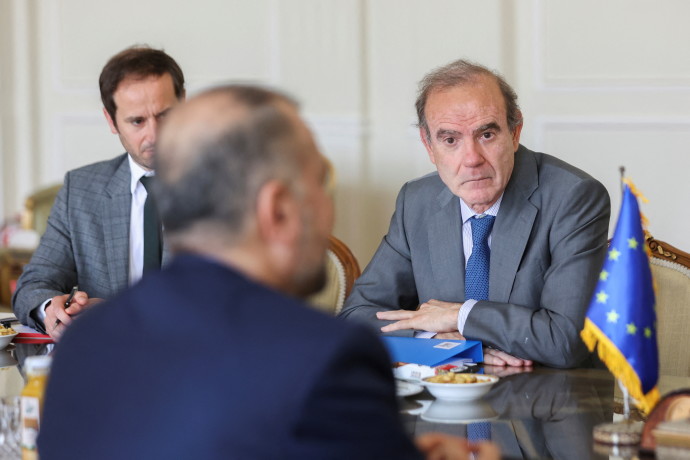Iran is “looking for a good, stable and strong agreement, but if the other party talks about plan B, we also have plan B,” Iranian Foreign Minister Abdollahian said.

Iran made a counter-offer to the European Union’s “final” draft to renew the 2015 nuclear deal, just at Brussels’s deadline to do so at midnight on Monday.
Iran’s response, as one diplomatic source put it, was a “yes, but,” rather than keeping with the EU’s “take it or leave it” formulation. Tehran essentially responded to the EU’s deadline by trying to extend it and continue negotiations, the source said.
The Islamic Republic called for greater guarantees that US sanctions would be lifted and would not disrupt economic activity.
In addition, they did not mention its demand for the International Atomic Energy Agency to cancel its investigations into traces of nuclear material found at undeclared sites in Iran. The EU draft states that if Iran gives credible responses as to the origin of those traces by the time the nuclear deal is meant to be implemented, then it will not oppose the probe’s closure.
Iran did not reject or accept that offer in its response, according to diplomatic sources.

US Special Envoy to Iran Rob Malley seemed to allow for the compromise in the EU draft, saying in an interview on Friday that the probes “will be closed when Iran provides the technically credible answers that the IAEA has requested of them…but not before.”
Mohammad Marandi, a spokesperson for Iran’s nuclear-negotiating team, told Al Jazeera Arabic that they are “not far from an agreement.”
“Iran has expressed its concerns in its response, but…remaining issues are not very difficult to resolve”
Mohammad Marandi
“Iran has expressed its concerns in its response, but…remaining issues are not very difficult to resolve,” Marandi said. “Those concerns are founded upon past US and EU violations. I can’t say there will be a deal, but we’re closer than we’ve been before.”
US State Department spokesman Ned Price said Monday, before midnight, that the US will provide its views on the EU’s final draft privately and directly to the bloc’s High Representative Josep Borrell, who is the coordinator of the Iran nuclear talks.
Iranian Foreign Minister Hossein Amir Abdollahian warned earlier in the day that Iran is “looking for a good, stable and strong agreement, but if the other party talks about plan B, we also have plan B.”
Abdollahian told Iranian journalists Tehran has “shown relative flexibility on two issues,” likely referring to demands for the US to remove the Islamic Revolutionary Guard Corps from its list of Foreign Terrorist Organizations and for the International Atomic Energy Agency to drop investigations into undeclared nuclear sites, which held up the negotiations for over five months. The US declined both demands, and the E3 – Britain, France and Germany – would not agree to the second.
Iran is “waiting for the flexibility of the American side in the third issue, which is guarantees,” Abdollahian said. He later added, in that vein, that the nuclear deal “has flaws like any other document, but the main flaw is that in the verification field, our commitments are fully investigated, but regarding the cancellation of sanctions, verification of the other party’s commitments is not very common.”
Comments made by Iranian Foreign Ministry spokesman Nasser Kanaani that though there was progress in recent nuclear talks in Vienna, the draft that the EU has called final “did not completely reach Iran’s legal demands.”
“Whether… this round of talks can [come] near an agreement depends on the other side, particularly the US, meeting Iran’s rightful demands,” he said.
Consultations were taking place at the highest levels in Tehran, Kanaani added.
The lead-up to the nuclear text
The 2015 Joint Comprehensive Plan of Action lifted sanctions on Iran in exchange for limitations on its nuclear program. These limitations would expire over time, ending in 2030, with restrictions on the manufacture of advanced centrifuges expiring next year. The Trump administration left the deal in 2018, opting for more sanctions instead, and the Biden administration began negotiating a return to the JCPOA early last year.
The EU, which coordinates the indirect talks between Iran and the US, said a draft it tabled earlier this month was final and that recent negotiations in Vienna were meant to deal with its technical aspects.
Reuters contributed to this report.
Content retrieved from: https://www.jpost.com/middle-east/iran-news/article-714811.